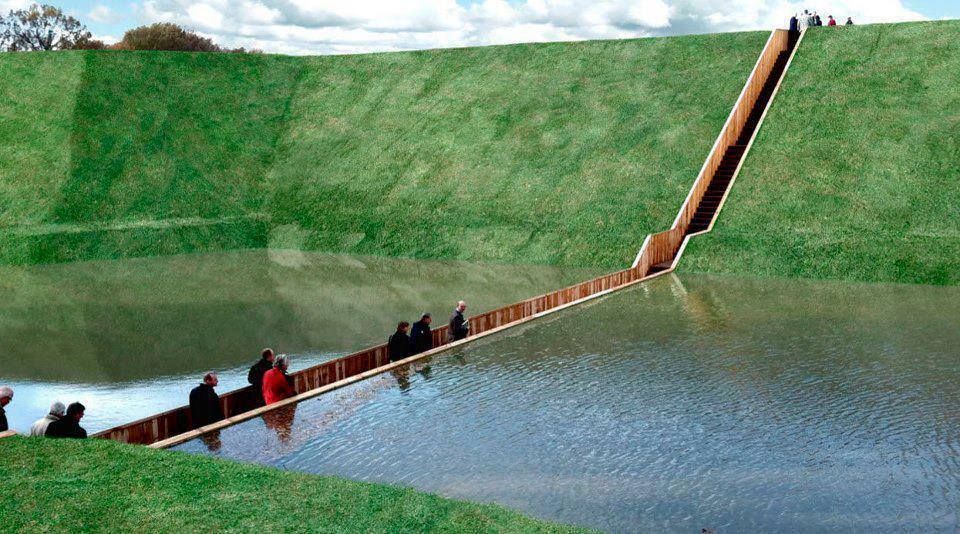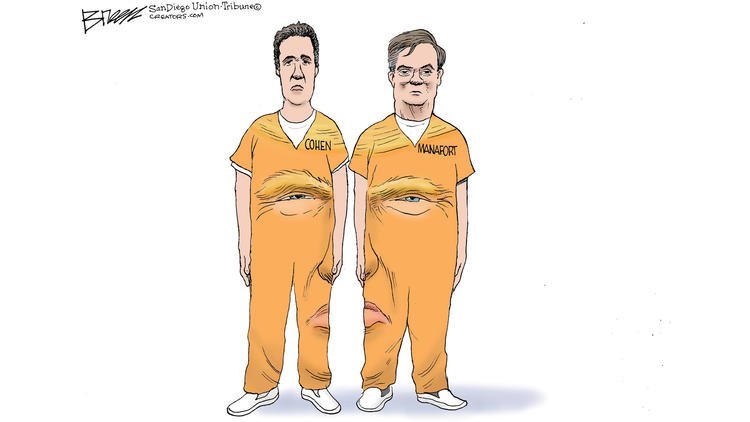The Daily Escape:

The Moses Bridge, Netherlands – photo via @archpics. The bridge, which crosses a moat, is made from waterproof wood.
We’re all busy trying to figure out what the twin “guilty” findings about Manafort and Cohen really mean, but Steve Breen nailed it:

Michael Cohen clearly put Trump in trouble by saying that Cohen had worked in coordination with Trump to silence the two women that Trump had affairs with, in order to influence the 2016 election.
Republicans say that finding two of Trump’s inner circle guilty has nothing to do with Russia, or with Trump, and Wrongo remains skeptical about what Mueller will actually prove.
OTOH, Cohen worked on a Trump Tower project that was supposed to be built in Moscow. He worked on that project during the 2016 presidential campaign. You may remember that in 2017, Trump said that no such relationship with Russia ever existed.
Manafort was convicted of tax evasion. The taxes Manafort didn’t pay were on income from Russian proxies, one of whom, the president, was running Ukraine for the Kremlin. Manafort’s conviction on bank fraud was related to bank loans he tried to get at least in part, to pay back $20 million he owed to a buddy of Vladimir Putin. His business also employed a Russian intelligence officer for years, and once Manafort was the Trump Campaign Manager, he offered that intelligence officer private briefings on the Trump campaign.
So, there are links to Russia for both men. But, the big ugly shoe to drop is whether Michael Cohen can corroborate what McClatchy journalists Peter Stone and Greg Gordon said a few months ago:
The Justice Department special counsel has evidence that Donald Trump’s personal lawyer and confidant, Michael Cohen, secretly made a late-summer trip to Prague during the 2016 presidential campaign…
No real proof has emerged that ties Cohen to a visit to Prague, or to meeting Russians. Cohen could tell Mueller whether the trip took place, and if Cohen strategized while there with Russians about the Kremlin’s playing a role in the US election.
Wrongo is again, skeptical. He doubts that the Trump organization would have Cohen undertake such a mission. But, if true, It would prove that the Trump campaign and the Kremlin worked together to help Trump win the White House.
Let’s turn briefly to a related idea: Facebook’s role as a platform for the spread of both disinformation, and as a rallying site for angry groups. In under the radar item at the NYT, a landmark study about violence against refugees in Germany shows that the most significant variable among towns with instances of violence was use of Facebook.
The work by Karsten Müller and Carlo Schwarz, researchers at the University of Warwick, shows:
Their reams of data converged on a breathtaking statistic: Wherever per-person Facebook use rose to one standard deviation above the national average, attacks on refugees increased by about 50 percent.
The researchers scrutinized every anti-refugee attack in Germany, 3,335 in all, over a two-year span. In each case, they analyzed the local community by all relevant variables. One thing stuck out. Towns where Facebook use was higher than average reliably experienced more attacks on refugees.
That held true in virtually any sort of community — big city or small town; affluent or struggling; liberal haven or far-right stronghold — suggesting that the link applies universally. From the NYT:
The uptick in violence did not correlate with general web use or other related factors; this was not about the internet as an open platform for mobilization or communication. It was particular to Facebook.
This has huge implications: Does social media scramble users’ perceptions of outsiders, of reality, even of right and wrong?
We all believe that Facebook has had an impact on amplifying division in our society. We all are dimly aware that Facebook uses algorithms to determine what appears in each user’s newsfeed. That algorithm’s mission is to present content that maximizes user engagement.
Posts that tap into primal emotions, like anger or fear, perform best, studies have found, and so proliferate. Wrongo said this a few days ago:
…fake news spread on social media has been proven to have a bigger impact, and to spread further and faster than real news.
There are two powerful forces within Facebook’s algorithms: A combination of fear of social change, and the “us-versus-them” rallying cries. Everybody knows that they are common on Facebook.
What should we as society, do about it?
